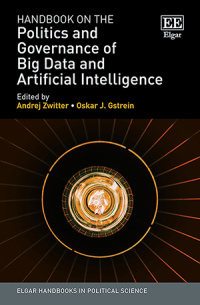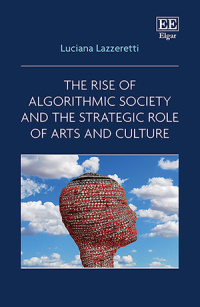
Hardback
Handbook of Critical Studies of Artificial Intelligence
随着人工智能(AI)继续渗透into more areas of society and culture, critical social perspectives on its technologies are more urgent than ever before. Bringing together state-of-the-art research from experienced scholars across disciplines, this Handbook provides a comprehensive overview of the current state of critical AI studies.
More Information
Critical Acclaim
Contributors
More Information
随着人工智能(AI)继续渗透into more areas of society and culture, critical social perspectives on its technologies are more urgent than ever before. Bringing together state-of-the-art research from experienced scholars across disciplines, this Handbook provides a comprehensive overview of the current state of critical AI studies.
Moving beyond narrow technological definitions of AI, the Handbook provides readers with an in-depth understanding of its social, ethical, and political implications. Chapters cover a broad range of timely issues related to AI, including the risk of bias and discrimination in its systems, its impact on democracy and governance, concerns surrounding privacy and surveillance, and the use of its technologies in decision-making processes. Underscoring the urgent need for deeper critical analyses of AI, the Handbook constitutes a major contribution to the ongoing discussion about what critical studies of AI can entail, what questions they may pose, and what concepts they can offer to address them.
Rich in theoretical and empirical analysis, this cutting-edge Handbook will prove an invaluable resource for students and scholars of digital sociology and science and technology studies. Its extensive coverage of this emerging field will also appeal to practitioners, developers, and policymakers seeking orientation in the complex social and political dynamics of AI.
Moving beyond narrow technological definitions of AI, the Handbook provides readers with an in-depth understanding of its social, ethical, and political implications. Chapters cover a broad range of timely issues related to AI, including the risk of bias and discrimination in its systems, its impact on democracy and governance, concerns surrounding privacy and surveillance, and the use of its technologies in decision-making processes. Underscoring the urgent need for deeper critical analyses of AI, the Handbook constitutes a major contribution to the ongoing discussion about what critical studies of AI can entail, what questions they may pose, and what concepts they can offer to address them.
Rich in theoretical and empirical analysis, this cutting-edge Handbook will prove an invaluable resource for students and scholars of digital sociology and science and technology studies. Its extensive coverage of this emerging field will also appeal to practitioners, developers, and policymakers seeking orientation in the complex social and political dynamics of AI.
Critical Acclaim
‘AI is not only technology; it also means power. In times when AI ethics is often closely aligned with big tech and when AI teams are expelled or undervalued, a critical view of AI is much needed. Addressing a diversity of aspects from political economy to sociotechnological imaginaries and activism, this Handbook offers a range of critical scholarship on AI that shows how AI is entangled with the social structures and power relations in society. A welcome antidote to the ideologies of technological optimism, technodeterminism, and technosolutionism, and great support for the critical and interdisciplinary project of developing technology that contributes to, rather than undermines, conviviality and the common good.’
– Mark Coeckelbergh, University of Vienna, Austria
在每天的生活中' AI的数量激增。虚拟的屁股istants such as Alexa and Siri are present on our phones and in our homes. More and more people use robotic lawnmowers and robot hoovers. There are bots on the Internet that post, comment, and like. Robots and AI have changed the world of work. ChatGPT has given us an impression of how online search could look like in the future. The world’s largest military forces are investing heavily into the development of AI. We need to better understand what impacts AI has on society. For doing so, we need critical theories and analysis of AI. The Handbook of Critical Studies of Artificial Intelligence provides 75 chapters that help us to better understand what it means to critically study AI in society. This book is excellent reading for everyone interested in AI & society.’
– Christian Fuchs, Paderborn University, Germany
– Mark Coeckelbergh, University of Vienna, Austria
在每天的生活中' AI的数量激增。虚拟的屁股istants such as Alexa and Siri are present on our phones and in our homes. More and more people use robotic lawnmowers and robot hoovers. There are bots on the Internet that post, comment, and like. Robots and AI have changed the world of work. ChatGPT has given us an impression of how online search could look like in the future. The world’s largest military forces are investing heavily into the development of AI. We need to better understand what impacts AI has on society. For doing so, we need critical theories and analysis of AI. The Handbook of Critical Studies of Artificial Intelligence provides 75 chapters that help us to better understand what it means to critically study AI in society. This book is excellent reading for everyone interested in AI & society.’
– Christian Fuchs, Paderborn University, Germany
Contributors
Contributors include: Kendra Albert, Fernando Avila Vian Bakir, Andrea Ballatore, Caroline Bassett, Andreas Beinsteiner, Anton Berg, Sukanto Bhattacharya, Abeba Birhane, Peter Bloom, Saba Rebecca Brause, Benedetta Brevini, Laila Brown, Manuel Carabantes, Vanja Carlsson, Janet Chan, Simona Chiodo, Ching-Hua Chuan, Coppélie Cocq, Randy Connolly, Karin Danielsson, Maggie Delano, Virginia Dignum, Anne Dippel, Lina Eklund, Niva Elkin-Koren, Severin Engelmann, Kalle Eriksson, Eran Fisher, Johnathan Flowers, Anna Foka, Maria Forsgren, Eleonore Fournier-Tombs, João Gonçalves, Dejan Grba, Gabriele Griffin, Jens Hälterlein, Kelly Hannah-Moffat, Jenna Imad Harb, Kashyap Haresamudram, Fredrik Heintz, Rasmus Helles, Kathryn Henne, Jan Hjelte, Steve G. Hoffman, Wolfgang Hofkirchner, Charlotte Högberg, Robert Holton, Andre Holzapfel, Stefka Hristova, Anna Jobin, Walter G. Johnson, Fabrice Jotterand, Kaisla Kajava, Christian Katzenbach, Miroslav Kotásek, Hans-Jörg Kreowski, Salla-Maaria Laaksonen, Amanda Lagerkvist, Signe Sophus Lai, Yucong Lao, Stefan Larsson, Ashlin Lee, Evelina Liliequist, Simon Lindgren, Janina Loh (neé Sombetzki), Stine Lomborg, Anders Sundnes Løvlie, Fenwick McKelvey, Andrew McStay, Samuel Merrill, Shintaro Miyazaki, Markus Naarttijärvi, Simone Natale, Axel Nyström, Carl Öhman, Emily Öhman, Andreas Öjehag-Pettersson, Chinasa T. Okolo, Will Orr, Juho Pääkkönen, Guy Paltieli, Orestis Papakyriakopoulos, Jaana Parviainen, Maayan Perel, Arun Teja Polcumpally, Ana Pop Stefanija, Lina Rahm, Tyler Reigeluth, Bo Reimer, Anais Resseguier, Vanessa Richter, Jonathan Roberge, Ben Roberts, Malin Rönnblom, Rinat Rosenberg-Kima, Carrie B. Sanders, Nitin Sawhney, Mike S. Schäfer, Daniel S. Schiff, Robyn Schimmer, Ralph Schroeder, Kasia Söderlund, James Steinhoff, Andreas Stenling, Michael Strange, Andreas Sudmann, Annika Svensson, Susanne Tafvelin, Zeerak Talat, Scott Timcke, Vicenç Torra, Andrea Aler Tubella, Jason Tucker, Katja Valaskivi, Pieter Verdegem, Mario Verdicchio, Rosalie A. Waelen, Ina Weber, Mikael Wiberg, Tanja Wiehn, Harry Yaojun Yan, Kai-Cheng Yang, Mike Zajko, Jing Zeng




